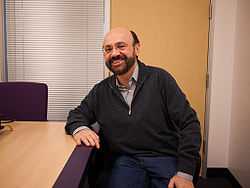Andrei Broder

Andrei Zary Broder (Hebrew: אנדרי זרי ברודר) is a Distinguished Scientist at Google. Previously he was a Research Fellow and Vice President of Computational Advertising for Yahoo!. Prior to Yahoo he worked for AltaVista as the vice president of research, and for IBM Research as a Distinguished Engineer and CTO of IBM's Institute for Search and Text Analysis.
Andrei Broder was born in Bucharest, Romania in 1953. His parents were medical doctors, his father a noted oncological surgeon. They emigrated to Israel in 1973, when Broder was in the second year of college in Romania, in the Electronics department at the Bucharest Polytechnic. He was accepted at Technion – Israel Institute of Technology, in the EE Department. Broder graduated from Technion in 1977,with a B.Sc. summa cum laude. He was then admitted to the PhD program at Stanford, where he initially planned to work in the systems area. His first adviser was Prof. John L. Hennessy. After receiving a "high pass" at the reputedly hard algorithms qual, Prof. Donald Knuth, already a Turing Award and National Medal winner, offered him the rare opportunity to become his advisee. Broder finished his PhD under Don Knuth in 1984. He then joined the newly founded DEC Systems Research Center in Palo Alto. At DEC SRC, Andrei was involved with AltaVista from the very beginning, helping it deal with duplicate documents and spam. When AltaVista split from Compaq that bought DEC, Andrei became its CTO and then Chief Scientist and VP of Research. In 2002, he joined IBM Research in New York to build its enterprise search product. In 2005, he returned to Silicon Valley and the Web Industry, as a Yahoo Fellow and Vice President. There, he put the bases of a new discipline, Computational advertising, the science of matching ads to users and contexts. At Yahoo, Broder also helped build Yahoo! Research into one of the leading Web research organizations. In 2012, Broder joined Google as a Distinguished Scientist, where he switched focus to another aspect of the WWW experience, large-scale personalization.
Over the last fifteen years, Broder pioneered several algorithms systems and concepts fundamental to the science and technology of the WWW. Some of the highlights are as follows: In 1997, Broder led the development of the first practical solution for finding near-duplicate documents on web-scale using "shingling" to reduce the problem to a set-intersection problem and "min-hashing" or to construct "sketches" of sets. This was a pioneering effort in the area of locally sensitive hashing, for which Broder eventually received the 2012 ACM Paris Kanellakis Award. In 1998, he co-invented the first practical test to prevent robots from masquerading as human and access web sites, often referred to as CAPTCHA [1] In 2000, Broder, then at AltaVista, together with colleagues from IBM and DEC SRC, conducted the first large-scale analysis of the Web graph, and identified the bow-tie model of the web graph.[2] Around 2001-2002, Broder published an opinion piece where he qualified the differences between classical information retrieval and Web search and introduced a now-widely-accepted classificaition of web queries intro navigational, information, and transactional,[3]
Broder earned his bachelor's degree (summa cum laude) from the Technion in Israel, and a master's degree and Ph.D. (1985) from Stanford University,[4] where his advisor was Donald Knuth. He is a fellow of ACM and IEEE.
Notes
- ↑ US 6,195,698, "Method for selectively restricting access to computer systems", published 2001-02-27
- ↑ Broder, Andrei; Ravi Kumar; Farzin Maghoul; Prabhakar Raghavan; Sridhar Rajagopalan; Raymie Stata; Andrew Tomkins; Janet Wiener (2000). "Graph structure in the web". Proceedings of the 9th World Wide Web Conference.
- ↑ Broder, Andrei (2002). "A taxonomy of Web search". SIGIR Forum.
- ↑ Andrei Broder at the Mathematics Genealogy Project
References
- Broder, Andrei (2006). "Interview: "Search without a Box"". Yahoo! Search Blog. Retrieved 2006-03-04.
- "Yahoo! Appoints Dr. Andrei Broder as Research Fellow". Yahoo! Press Release. 2005. Retrieved 2006-03-04.